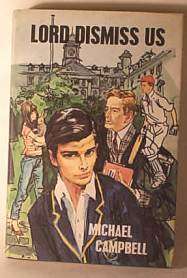Lord Dismiss Us
Lord Dismiss Us is a 1967 novel by Michael Campbell.
 Lord Dismiss Us book cover | |
| Author | Michael Campbell |
|---|---|
| Country | United Kingdom |
| Language | English |
| Genre | Novel |
| Publisher | William Heinemann |
Publication date | 1967 |
| Media type | Hardback and paperback |
| Pages | 378 p. (hardback edition) |
| ISBN | 978-0-552-08042-2 |
| OCLC | 30292393 |
Plot summary
Lord Dismiss Us is set in an English boys' public school in the 1960s. The novel deals with the love affair between two boys, together with the internal politics of the school itself. Carleton, a sixth former loves Allen, a boy two years his junior. At the same time, the headmaster is trying to enforce a policy against such liaisons.
At the time of writing it was a contemporaneous work. As such it now depicts a school at a period in history. It was published in the same year that homosexuality between consenting adults was legalised in the UK.[1]
The author, Michael Mussen Campbell, b. 1924, was the grandson of the 1st Lord Glenavy and brother of the 3rd Baron, the humorist Patrick Campbell. He was a Dubliner who attended St Columba's school and Trinity College. Lord Dismiss Us was apparently based on the suicide of a St. Columba's schoolmaster.
Briefly a barrister at the Irish bar, Campbell worked in London for the Irish Times. His other novels included Peter Perry (1956), a 'story of Dublin Theatrical Life', and Oh Mary, This London (1959), a fantasy set in London, and Across the Water (1959).
Michael Campbell succeeded his brother Patrick in 1980 to become the 4th and last Lord Glenavy. He never married, dying in 1984.
Adaptations
In 2017, Taggart creator Glenn Chandler[2] adapted the novel into a play for the Edinburgh Festival Fringe, to mark the 50th Anniversary of the partial legalisation of homosexuality in England and Wales.[3] The play received positive reviews,[4][5][6][7] and subsequently transferred to the Above The Stag Theatre in London later that year.[8] The play was once again reviewed positively,[9][10][11] and received four Off West End Award nominations, including 'Best Production' and 'Best New Play'.[12]
References
- "Sexual Offences Act 1967". Office of Public Sector Information. 1967. Retrieved 7 July 2010.
- "Taggart creator reveals he almost committed suicide as he struggled with sexuality" The Express Retrieved 18 November 2017
- "Taggart writer Glenn Chandler opens up about his new play marking 50 years since homosexuality was legalised" Daily Record Retrieved 18 November 2017
- "Lord Dismiss Us Five Star Review, BroadwayBaby" Archived 1 December 2017 at the Wayback Machine BroadwayBaby Retrieved 18 November 2017
- "Review: Lord Dismiss Us, theSpace at Surgeon’s Hall" A Younger Theatre Retrieved 18 November 2017
- "Edinburgh Review: Lord Dismiss Us at The Space @ Surgeons Hall" Theatre Weekly Retrieved 18 November 2017
- "Michael Campbell’s 1967 novel Lord Dismiss Us has been skilfully adapted by award-winning playwright Glenn Chandler." British Theatre Guide Retrieved 18 November 2017
- "Lord Dismiss Us – The darkly funny new play at the UK’s only LGBT theatre." QX Magazine Retrieved 18 November 2017
- "REVIEW: Lord Dismiss Us, Above The Stag ✭✭✭✭" BritishTheatre.com Retrieved 18 November 2017
- "Lord Dismiss Us, Above The Stag Theatre – Review" Everything Theatre Retrieved 18 November 2017
- "Review of Lord Dismiss Us at Above The Stag Theatre" LondonTheatre1 Retrieved 18 November 2017
- "The Offies (The Off West End Theatre Awards)" Archived 24 December 2011 at the Wayback Machine The Offies Retrieved 18 November 2017